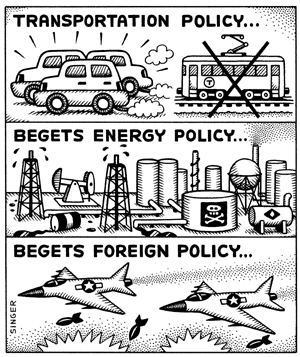Ration oil during war
— Or is this a War on Conservation?
by Jan Lundberg
If the U.S. is waging a "War on Terrorism," federal energy policy would reflect that the war is not a "war for oil." Even if what we've had is a war of terror (nothing new, if you ask Indo-Chinese victims of U.S. shock-n-awe), that's not exactly a war for oil.
As oil is a strategic commodity essential to the present economy and military, then policies should be geared toward conserving oil. Everyone knows they are not; little conservation has happened since Jimmy Carter's tentative efforts. A national paving moratorium was proposed in 1990 in part to stop the lengthening of the nation's (oil) supply lines in time of war (Operation Desert Storm).

Approximately 20 million barrels a day of oil and refined products are being sucked unsustainably from the finite Earth just for the USA's burning and spilling the stuff. Neither the oil industry nor its White House acknowledges the impossibility of maintaining this rate. Because of free-market economists' ideology about the "creation" of supply, the future is never more than ten years off in their practical planning. As for an oil crisis hitting hard in the first decade of this century, this is not real to the oil fraternity because (1) it implies great change in an industry that's not generally about energy; petroleum is unique and specialized, and (2) it's the next quarterly report that really counts in big business.
World War II was a war for oil, in large measure, considering Axis and Allied aims and strategies. And the Axis - which happened to ultimately lose the war - was finally cut off from sufficient supplies of oil. But the U.S. had to ration oil and other products so that it would not run out during war. What have we learned from our history?
Critical oil stats
The number of days of supply of immediately marketable crude oil for the nation is only about 17 (seventeen), in terms of total supply already pumped out in the U.S. and having been imported. This is a typical level. That statistic is derived from knowing there are about 278 million barrels of crude now on hand, out of the ground, and almost 16 million barrels are used per day. There is also about a month's worth of oil in the Strategic Petroleum Reserve (SPR), which could be brought to surface, refined and distributed. All the SPR oil cannot be brought to market at once; the idea is that an orderly drawdown could keep supply and demand in balance for several months. (The commonly assumed SPR scenario does not solve a serious long-term shortage such as from declining global reserves.) As for petroleum products, mostly gasoline and diesel, there is only about a week and a half supply in the U.S.
Add the maximum available crude and refined products together, and you have a little over two months of oil supply for driving, some heating, and a few lesser energy uses in the U.S., if we assume the crude is refined into fuels (over half of it is).
The bigger assumption is that domestic pumping and especially importing will keep going "forever." Fifty-eight percent is the level of oil importation today - another reason for the attack on Iraq?
U.S. gasoline consumption is well over 9 million barrels (or over 400 million gallons) per day in summer. Almost nothing is currently being done to decrease this. To the contrary, conservation is anathema to the "conservatives" in control of the government. (See San Francisco Chronicle op-ed "And when cheap oil runs out... Enter the Age of Conservation" by Jan Lundberg, May 6, 2001.)

